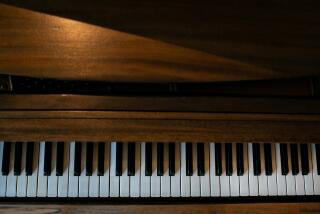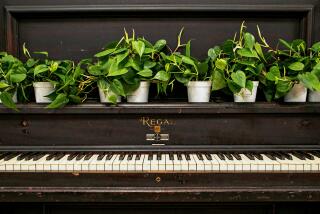A Child Prodigy . . . 90 Years Later : Though his eyesight and hearing are fading, pianist Horszowski manages an active career at age 97
- Share via
PHILADELPHIA — Mieczyslaw Horszowski’s eyesight is failing now, so he no longer plays concerts or chamber music that require him to read music. His hearing is fading too, but the former child prodigy who began playing in the last century still maintains an active career as a soloist, teacher and recording artist.
“Although I can’t see the keys, I see the notes in my mind well in advance. I have to fill my memory with notes these days,” the 97-year-old pianist says.
He is a small man, hardly 5 feet tall. His shoulders are slightly hunched from years of hovering over the piano. His speech is slow, deliberate and--when speaking English--laced with a heavy accent from his native Poland. When he is happy, he enthusiastically slaps his knee. And when he is not he has an iron will to get what he wants.
He is intensely private and usually doesn’t open up about himself. When he does, it is because he knows the other person--and then it’s in Polish. His wife, Bice Costa, 57, does most of the talking for him now.
“There are times when he worries that he’ll have the strength for the performance,” she says. “But he must. He has been performing before the public all his life. It is natural for him as a fish to swim.”
A piano prodigy in Poland around the turn of the century, Horszowski composed at an early age--by age 7 he had written two works for the piano. Between 1902 and 1911 he averaged 100 concerts a year. During the 1970s and 1980s he almost disappeared from the recital scene to play mostly chamber music.
Today he performs about 15 recitals a season in Europe and America, including a scheduled Wednesday performance at the Dorothy Chandler Pavilion. His repertory for his third recital in Los Angeles (he performed here in 1977 and 1953) will be a demanding program of works by Bach, Beethoven, Schumann and Chopin.
The Times’ reviewer, Albert Goldberg, wrote of his most recent L.A. concert: “Horszowski is more than a study in geriatrics. His courtly style and meticulously refined playing may represent a past era but they are far from being outmoded or old-fashioned. That sort of pianistic mastery and comprehensive musicianship is timeless.”
As he gets older, Horszowski claims to need less practice.
“Today, the piano literature for me is a question of study, not practicing. I practice until the fingers lose their attentiveness, then I stop,” he says. But his wife reports that his attitude toward practice is more like anxiety--the worry about having enough strength to continue performing and teaching.
Horszowski, who doesn’t smoke and drinks “only a bit of wine,” has the energy of a much younger man. After a recent full-length recital and greeting numerous fans backstage, he refused to be helped down the Metropolitan Museum of Art’s grand staircase, negotiating the steps himself. Once down and awaiting a taxi, he declined a chair. Last May he completed a grueling five-day recording session and his new recording, a collection of works by Bach, Beethoven and Chopin for Nonesuch, will be out this spring to coincide with his return to Carnegie Hall, where he first played 84 years ago.
Today, Horszowski maintains a full schedule. His year includes a teaching stint at the Curtis Institute of Music in Philadelphia until May, then a tour of Europe with a midsummer break at a family home near Genoa. He’s a perennial at the Lucerne Festival in Switzerland around the beginning of September, playing and teaching master classes. Then it is more touring, followed by a return to Curtis.
As a teacher, Horszowski has taught generations of pianists, such as Peter Serkin, Eugene Istomin, Richard Goode, Anton Kuerti, Kathy Selby and Murray Perahia. His credo, which he would like prominently placed in all music schools: “Not one note of the masters can be improved but the playing of all of them can always be improved.”
Horszowski has been a faculty member at Curtis since 1942. “Rudolf Serkin invited me to join, and I have remained here ever since,” he says.
Rudolf Serkin’s son Peter says: “I wish I could still study with him. Part of the experience of being his student is the privilege of seeing him examine a piece of music with a certain freshness.”
Horszowski usually teaches by having the student select a specific work, which must be so thoroughly known it may require a few days before the lesson can be analyzed. Then Horszowski plays the work, demonstrating it musically and explaining it verbally, sometimes with the work’s history. His students commend him for allowing them wide latitudes of interpretation, enabling the student’s temperament to enter the music.
Seymour Lipkin, who was one of Horszowski’s first students at Curtis and who still teaches there (and at the Juilliard School of Music), says: “Horszowski is a descendant from the Romantic age. And yet his concern is always above all to the integrity of the composer’s message. In his teaching he stresses that we absolutely cannot take flights of fantasy with the score. In interpretation, we all try to keep our personalities out of the composers’, but as hard as we try, we really cannot.”
Goode recalls a lesson on “the Beethoven Sonata, Opus 110, and I really carried on a bit much, musically--and vocally as well. After completing the work, he said gently but firmly, ‘Richard you must remember this is a sonata for the piano, and not for pianists.”
Horszowski also has some strong views on music in general:
* On audiences: “In general, musicians try to play like recordings today. Audiences expect that. They talk about wrong notes when it is not played like the recordings. Today, people say, ‘Oh, this note came false.’ In my time it didn’t matter as much, you see.”
* On contests: “For students, today, competition is everything. In my day there were none. So students prepare and study the repertory not for themselves, but for the judges.”
* On pianists: “Differences of interpretation and dynamics have largely disappeared. For pianists it is important to play Bach, Mozart, Beethoven, and Chopin . . . all the rest come after them.”
* On repertory: “Most pianists limit themselves to playing the same music. There is so much music available today, yet pianists shy away and play a small repertory. There isn’t any army large enough to play it all.”
Horszowski waited until he was 89 years old to marry. His first and only trip to the altar was with Bice Costa, a former concert pianist and family friend from Genoa. The marriage rejuvenated his recital career and the couple is inseparable, whether for trips to concerts in Europe or to the corner store.
They live in a large high-rise apartment filled from floor to ceiling with books on every subject. The music room is dominated by a concert grand Steinway, but highlighted by an etching of his mentor, Theodor Leschetizky. Their home is just a couple of blocks from Curtis, and Horszowski often walks to his classes.
Horszowski’s wife believes he still has much to say, musically. “To listen to him perform is an education for the rest of us,” she says.
Horszowski, when asked about his late-in-life marriage to a wife decades younger, explained in a coy manner: “It only goes to prove that there is no such thing as a confirmed bachelor.”
Quickly changing the subject, he remarks, “Did you know I was related to Beethoven?” In a pedagogical sense he is the great-grandchild of the Bonn master. Beethoven’s star pupil was Carl Czerny, who taught Leschetizky, who in turn was Horszowski’s teacher.
“It gives those who study with Horszowski a thread of lineage, a sense of continuity,” explains Peter Serkin. “Horszowski is the last important pianist in the chain.”
Leschetizky, Horszowski says, along with Franz Liszt were the premiere teachers of the Golden Age. Leschetizky taught Artur Schnabel, Ignace Paderewski, Ossip Gabrilowitsch, Ignaz Friedman and a litany of piano giants. Horszowski credits his mentor’s genius with producing a great number of virtuosos--yet allowing each one to develop a unique individuality.
Artistic sincerity and effective use of contrasts in performance, Horszowski says, were his teacher’s approach to music. Digging for the essence of the score and the singing line were paramount. “The professor,” he says, “abhorred technical displays as such.”
“From Leschetizky I learned the beautiful sound of the piano, and how to produce it. He also taught me the strongest sense of rhythm, without which the music does not hold together nor make its impact.”
Horszowski was born in Lwow, Poland, in 1892. His mother, a pianist who studied with Chopin’s pupil Karol Mikuli, was his first teacher. He recalls as if it were yesterday his first lessons at the age of 3. By age 5 he was transposing from memory Bach’s Inventions.
At the age of 7 his mother took him to Vienna to begin his formal lessons with Leschetizky, the famous pianist, composer and teacher. Horszowski recalls that he was wearing a Polish native costume complete with red sash, long black boots, and even a peacock feather stuck in his hat. “You see,” Horszowski says, “the professor was very impressed, for he too was Polish.”
He made his debut in 1899 at the Bosendorfersaal in Vienna, before Emperor Franz Josef. “It was a hall with a small stage. You had to climb five stairs to reach the stage. But on the risers were the names of Anton Rubinstein, Clara Schumann, Hans von Bulow, Franz Liszt and Johannes Brahms. A young pianist was very serious when he finally reached the stage.”
“Between the wars I was known as an exponent of modern music,” he says. “I played a lot of Debussy and Ravel.” Today he plays no contemporary music.
“Faure, when I played his music, had his own individuality, which made his work different from those of his contemporary Saint-Saens.” But today he feels that one composer writes like all the others and that the current way of writing does not allow or permit strong individuality.
Now Horszowski’s repertory centers around the classical masters, which he has spent a lifetime studying and exploring--Bach, Mozart, Beethoven, Chopin and Schubert--and his memory remains sharp for their works.
“When I was 75, I vowed never to write my memoirs,” he says. “I am pleased with the things I forget, for I would like to keep my mind open and fresh for new impressions.”
But he can’t help looking back. Horszowski says that years ago there was a greater respect for music, and also for the musician.
In summary, his musical philosophy is succinct: “When we play music, or even listen to music, we should only be musicians--and not just professionals who look for some smart trick to copy.”
More to Read
The biggest entertainment stories
Get our big stories about Hollywood, film, television, music, arts, culture and more right in your inbox as soon as they publish.
You may occasionally receive promotional content from the Los Angeles Times.










